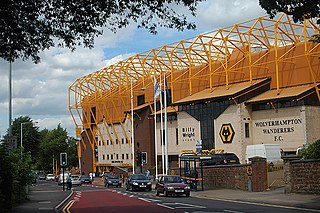This article concerns football records in England. Unless otherwise stated, records are taken from the Football League or Premier League. Where a different record exists for the top flight, this is also given. This article includes clubs based in Wales that compete in English leagues.

The English Football League Championship, known simply as the Championship and for sponsorship purposes as Sky Bet Championship, is a professional football league in England and Wales. EFL Championship is the highest division of the English Football League (EFL) and second-highest overall in the English football league system, after the Premier League, and is contested by 24 clubs.
The 1888–89 season was the 18th season of competitive association football in England.
1840s – 1850s – 1860s – 1870s – 1880s – 1890s – 1900s – 1910s – 1920s – 1930s – 1940s – 1950s – 1960s – 1970s – 1980s – 1990s – 2000s – 2010s – 2020s
The 1997–98 season was the 118th season of competitive football in England.

The English Football League (EFL) is a league of professional football clubs from England and Wales. Founded in 1888 as the Football League, it is the oldest football league in the world, and was the top-level football league in England from its foundation until 1992, when the top 22 clubs split from it to form the Premier League. The Football League was rebranded as the "English Football League" (EFL) starting with the 2016–17 season.
The 1976–77 season was the 78th completed season of The Football League.
The 1991–92 season was the 93rd completed season of The Football League.
The 1991–92 Football League First Division was the 93rd edition in Football League First Division existence, and the division's final season as the topflight of English football.
The 2015–16 Football League Cup was the 56th season of the Football League Cup. It began on 11 August 2015 and concluded on 28 February 2016. It was a knock-out competition for the top 92 football clubs played in English football league system.
The 2016–17 EFL Cup was the 57th season of the EFL Cup, formerly known as the Football League Cup, featuring all 92 clubs from the Premier League and the English Football League (EFL). The cup did not have a sponsor following the withdrawal of sponsorship from Capital One after four years as the Capital One Cup, but was renamed the EFL Cup after the Football League was rebranded as the English Football League.

Wolverhampton Wanderers Football Club is a professional association football club based in Wolverhampton, West Midlands. Founded in 1877 as St. Luke's, they adopted their current name in August 1879. Wolves began playing league football in 1888 when they were nominated to become one of the twelve founder members of the Football League. Wolves remained in the Football League for 115 years in different divisions, in this time the club were English football champions for three seasons. In 2003 they were promoted into the Premier League, which had replaced the Football League's First Division at the top of the English football league system in 1992. The team were relegated back into the Football League after one season in the Premier League. Their second promotion to the Premier League came in 2009 and this spell spanned three seasons. Between 2012 and 2018 the club were playing in the Football League until their third promotion to the Premier League at the end of the 2017–18 EFL Championship season. In the current 2023–24 season, Wolves are playing at the top level of the domestic professional game for a sixth consecutive season, and their tenth at this level since the formation of the Premier League in 1992.

The 2017–18 EFL Cup was the 58th season of the EFL Cup. The competition was open to all 92 clubs participating in the Premier League and the English Football League. It was known as the Carabao Cup due to the start of a sponsorship deal with Carabao Energy Drinks after the tournament was unsponsored the previous year. The final took place at Wembley Stadium in London.
The 2019–20 EFL Cup was the 60th season of the EFL Cup. Also known as the Carabao Cup for sponsorship reasons, the competition was open to all clubs participating in the Premier League and the English Football League.
Bolton Wanderers Football Club, an English association football club based in Bolton, Greater Manchester, England was founded in 1874 as Christ Church Football Club before adopting its current name in 1877. Bolton were one of the 12 founder members of the Football League, which formed in 1888. The club has remained in the Football League since it was established competing in its various divisions. As of the end of 2022–23, the club's first team has spent 74 seasons in the first tier of English football, 33 in the second, 15 in the third and two in the fourth. They are currently competing in EFL League One, the third tier.
The 2020–21 EFL Cup was the 61st season of the EFL Cup, the competition is open to all clubs participating in the Premier League and the English Football League.
The 2021–22 EFL Cup was the 62nd season of the EFL Cup. The competition was open to all clubs participating in the Premier League and the English Football League.

The 2024–25 EFL Cup is the 65th season of the English Football League Cup. It is sponsored by Carabao Energy Drink and known as the Carabao Cup for sponsorship reasons. The EFL Cup is open to all clubs participating in the Premier League and the English Football League.




